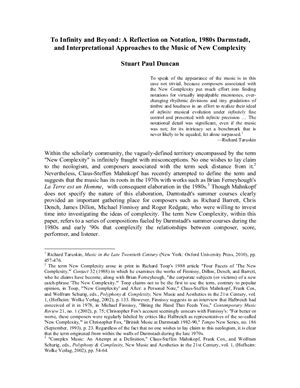Within the scholarly community, the vaguely-defined territory
encompassed by the term
"New Complexity" is infinitely fraught with misconceptions. No one wishes to lay claim
to the neologism, and composers associated with the term seek distance from it.
Nevertheless, Claus-Steffen Mahnkopf has recently attempted to define the term and
suggests that the music has its roots in the 1970s with works such as Brian Feeyhough's
La Terre est un Homme, with consequent elaboration in the 1980s.
Though Mahnkopf does not specify the nature of this elaboration, Darmstadt's summer courses clearly provided an important gathering place for composers such as Richard Barrett, Chris
Dench, James Dillon, Michael Finnissy and Roger Redgate, who were willing to invest
time into investigating the ideas of complexity. The term New Complexity, within this
paper, refers to a series of compositions fueled by Darmstadt's summer courses during the
1980s and early '90s that complexify the relationships between composer, score,
performer, and listener.
The battlefield surrounding this music has long been home to a variety of
polemical invectives, including the arguments that the composers are searching for the
perfection of abstract compositional systems with attendant notational representations.
Similarly, critics inveigh against the impossibility of both performing an "accurate"
realization of the score and hearing its underlying compositional processes. In the
introductory quote, Taruskin alludes to these invectives, arguing that the composers were
grasping for some unrealizable perfection. In order to attempt such a realization, Taruskin
claims that composers presume an infinite capacity for technical development and
notational realizations that push past all rational boundaries when considered by
performers and listeners. This view, which has gained a certain amount of traction in the
scholarly world, asserts that the music of New Complexity is divorced from performers
and listeners, and that the composers are instead interested solely in the blackness of the
score and the construction of abstract compositional systems.
In this paper I offer a broad examination of these issues in order to construct
defensible grounds for distinguishing the challenges of New Complexity from the
integral-serialist concepts and practices of the 1950s and '60s. Such an examination
cannot exhaustively cover the issues it seeks to resolve. Instead, this paper draws
attention to these issues and lays groundwork for future research. In particular, this paper
will consider three main areas: 1) the unsympathetic responses to New Complexity that
presume direct, transparent relationships between composer and score, score and
performer, and performer and listener; 2) the representation of 1980s Darmstadt as a
embodiment of the earlier period of the 1950s and '60s and consequently a depiction of
Feeyhough's role as a continuation of Karlheinz Stockhausen's—in teaching as well as
in music; 3) responses by sympathetic performers to the works of New Complexity that
reveal a different performance practice eschewing the notion that transparent
relationships exist.
"New Complexity" is infinitely fraught with misconceptions. No one wishes to lay claim
to the neologism, and composers associated with the term seek distance from it.
Nevertheless, Claus-Steffen Mahnkopf has recently attempted to define the term and
suggests that the music has its roots in the 1970s with works such as Brian Feeyhough's
La Terre est un Homme, with consequent elaboration in the 1980s.
Though Mahnkopf does not specify the nature of this elaboration, Darmstadt's summer courses clearly provided an important gathering place for composers such as Richard Barrett, Chris
Dench, James Dillon, Michael Finnissy and Roger Redgate, who were willing to invest
time into investigating the ideas of complexity. The term New Complexity, within this
paper, refers to a series of compositions fueled by Darmstadt's summer courses during the
1980s and early '90s that complexify the relationships between composer, score,
performer, and listener.
The battlefield surrounding this music has long been home to a variety of
polemical invectives, including the arguments that the composers are searching for the
perfection of abstract compositional systems with attendant notational representations.
Similarly, critics inveigh against the impossibility of both performing an "accurate"
realization of the score and hearing its underlying compositional processes. In the
introductory quote, Taruskin alludes to these invectives, arguing that the composers were
grasping for some unrealizable perfection. In order to attempt such a realization, Taruskin
claims that composers presume an infinite capacity for technical development and
notational realizations that push past all rational boundaries when considered by
performers and listeners. This view, which has gained a certain amount of traction in the
scholarly world, asserts that the music of New Complexity is divorced from performers
and listeners, and that the composers are instead interested solely in the blackness of the
score and the construction of abstract compositional systems.
In this paper I offer a broad examination of these issues in order to construct
defensible grounds for distinguishing the challenges of New Complexity from the
integral-serialist concepts and practices of the 1950s and '60s. Such an examination
cannot exhaustively cover the issues it seeks to resolve. Instead, this paper draws
attention to these issues and lays groundwork for future research. In particular, this paper
will consider three main areas: 1) the unsympathetic responses to New Complexity that
presume direct, transparent relationships between composer and score, score and
performer, and performer and listener; 2) the representation of 1980s Darmstadt as a
embodiment of the earlier period of the 1950s and '60s and consequently a depiction of
Feeyhough's role as a continuation of Karlheinz Stockhausen's—in teaching as well as
in music; 3) responses by sympathetic performers to the works of New Complexity that
reveal a different performance practice eschewing the notion that transparent
relationships exist.

